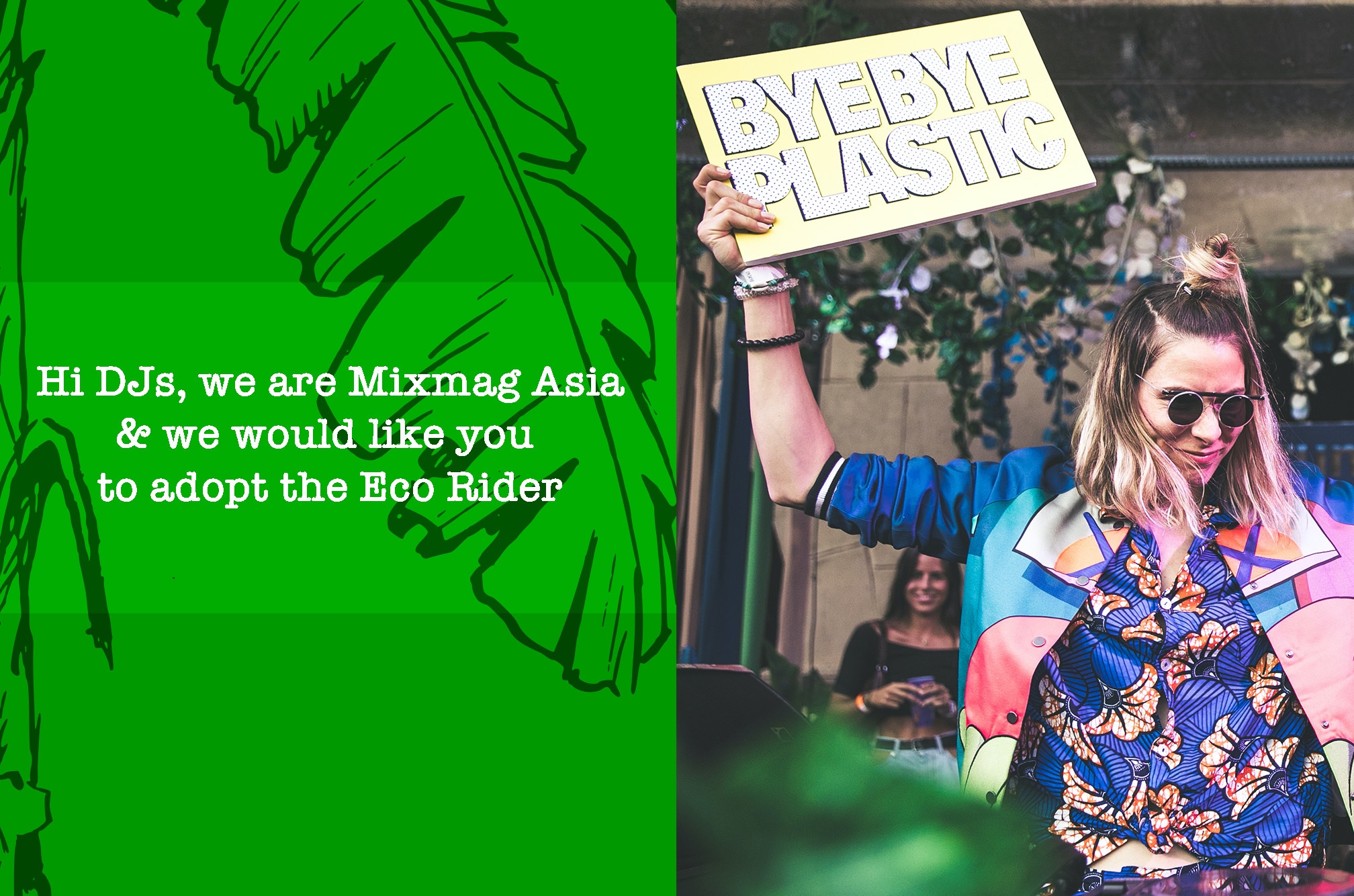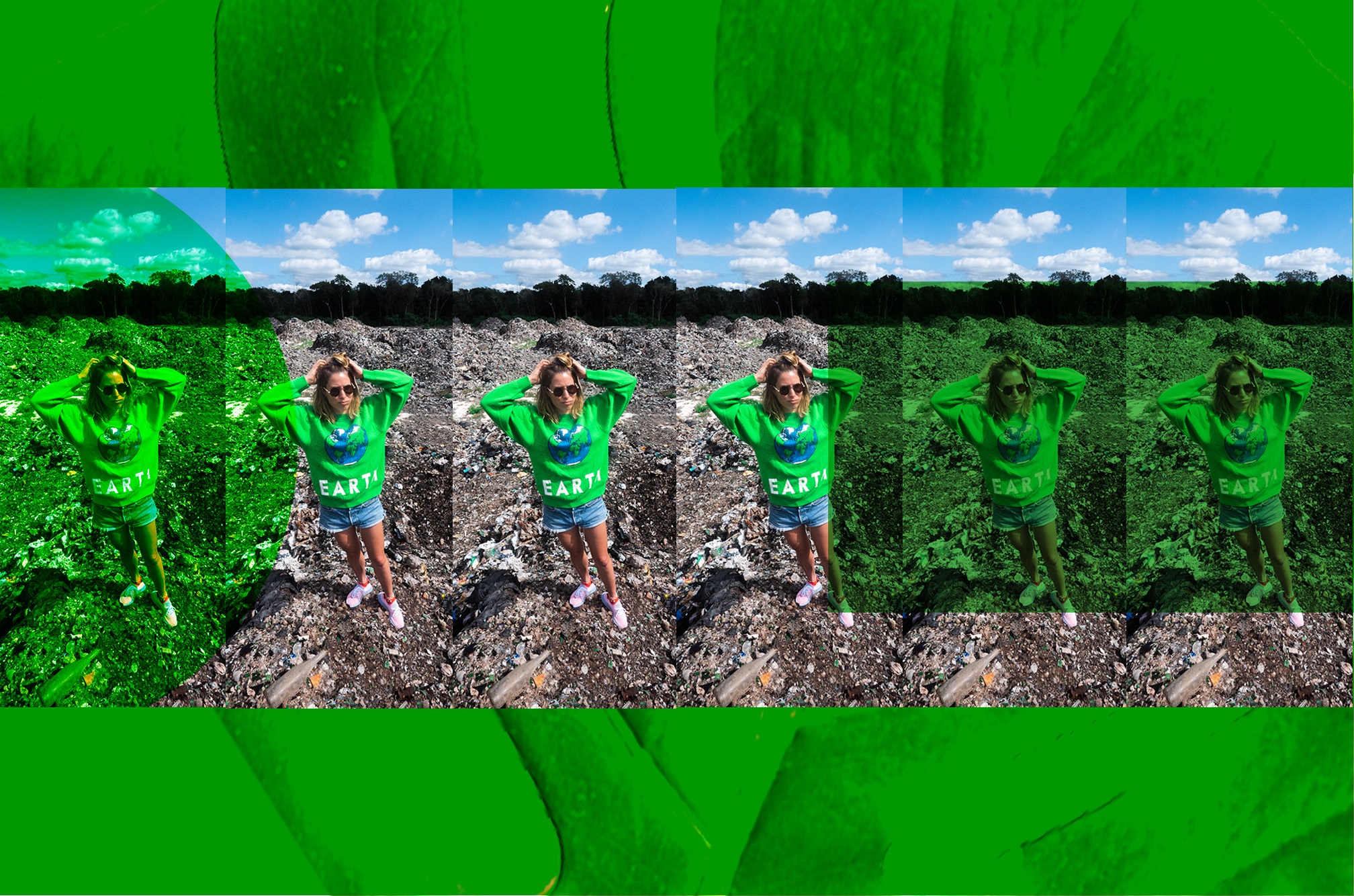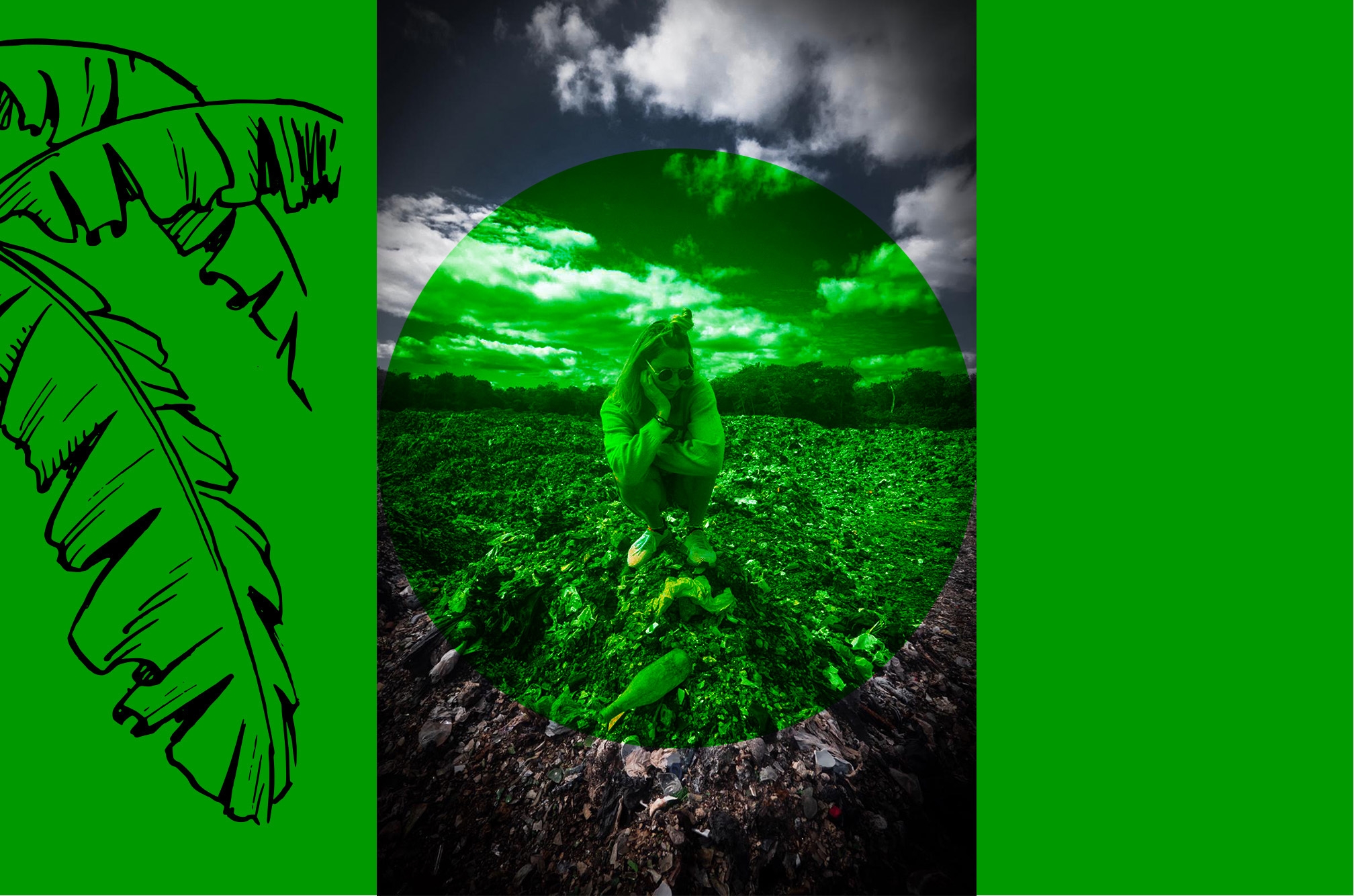 Green Room
Green Room
Hi DJs, we are Mixmag Asia & we would like you to adopt an Eco Rider
Thanks to Blond:ish, our planet is no longer irredeemably screwed
You probably know her as Blond:ish, but I know her as the music industry’s chief eco-hero. The day Vivie-Ann Bakos played at Warung Beach Club in Brazil to a trash mountain of single-use plastic was also the day that the music industry became conscious (things are bittersweet like that, kind of like Marmite). Not right away, of course, but it was the day that Blond:ish decided that she was going to clean up our dirty little music industry.
Festivals are muddled with indulgence. And we get it; it’s hard to activate your morals when there is a buffet of DJs playing an idyllic festival on a tropical island in a country you’ve never heard of. The inconvenient truth is also that we’re not going to rejig our lives just to save a couple tons of CO2 and buy tickets to a community yoga festival instead. Wouldn’t it be great if you could be a hedonist and a hippy? Actually, you can, and festivals like Burning Man are a testament to that. The event draws upwards of 100,000 people who emerge after a week in the desert with a guilt-free comedown after having left literally no trace (we can’t say the same for their dignity though). Even still, there is something contradictory with going about your week refilling your S’Well bottle and dodging plastic straws just to get on a plane to an extravagant festival where you create as much damage to the environment as you do your insides.
But in fact, these #LittleGreenSteps do matter and add up to one collective big step when you get enough people involved. Now, imagine getting the entire music industry involved in the plight — that could equate to real change. That's what Vivie-Ann thought as she gazed out into a sea of plastic from that fateful DJ booth in Brazil, also known as the aha moment that made headlines. Poised to create momentum, she started a movement by using her podium (and power) to push towards a more sustainable party scene and revived faith in the collective power of action. And as such, Bye Bye Plastic was born — an initiative that is activating DJs, clubs and festivals to eradicate single-use plastic from the music industry by 2025.
Soon after came the Eco Rider. Not to be confused with being a modish add-on for your philanthropic front, the Eco Rider is used by artists to request that venues and events commit to banishing single-use plastic from the vicinity for the duration of their show — essentially throwing a #PlasticFreeParty. Today, the Eco Rider has been adopted by something like 2,000 artists including Damian Lazarus, Ben Klock, Amelie Lens, Sven Väth, Soul Clap, Tale of Us, Acid Pauli and many more.
Music has always been a strong social connector, and by activating the collective power of the music industry, we stand a chance at restoring balance to our planet before we annihilate it any further. How can we get involved from Asia? We practically begged Vivie-Ann and Bye Bye Plastic co-founder Camille Guitteau to let us help. Let's get this plastic-free party started….

So you want to eradicate plastic from the electronic music industry by 2025, how are you doing that?
Vivie-Ann: There are a couple of ways we're doing this, but we nailed our primary strategy, which is really relevant right now. We activate DJs by giving them the tool they need to have a plastic-free DJ booth — the Eco Rider. That has created a ripple effect and created these little communities around the music industry. Now thousands of DJs are requesting a plastic-free rider, and that's created a lot of talk about a plastic-free movement in the industry.
You STARTED with 1,500 artists. Where are you at now?
Vivie-Ann: More than 2,000.
And how easy is it for an artist to implement? Is it open even to the small DJ from the nightclub you never heard of in Asia?
Viv: Absolutely, and making it easy is a big part of it. The movement is essentially about making small and actionable steps for everyone to implement, so we tried to make it as easy as possible. The Eco Rider is free and downloadable from our website, and any artist can add it to their rider.
DJs, producers, promoters, organisers, etc., they only make up the 1%. What can other individuals do to get involved — like fans, the crowds and the clubgoers?
Vivie-Ann: Knowledge! Our mantra for action is that knowledge is power and power is action. And individual actions turn into a collective, which then turns into collective power. Also, by activating DJs, we're also activating their communities, and then their fans also become interested in having a plastic-free dance floor (who doesn't want that?).
Have you just set out to reduce plastic or do you have a higher goal in mind for Bye Bye Plastic?
Vivie-Ann: Fighting climate change is a bit harder to tackle because it's not tangible. That comes after you're hooked, and when you're in the thick of the sustainability movement — and plastic is the avenue to get there. But we do work with other music industry organisations to tackle bigger issues, like Association for Electronic Music (AFEM) where we are active members of their Green Working Group, which works on climate change across the entire music industry. Our team also advocates for cleaner fuels and carbon offsetting, which we integrate into all our processes, whether it's into a DJ booking or travel to a festival. We're all working on this in tandem because these issues go hand in hand.
Camille: We're also part of these bigger groups that have greater priorities within the sustainable agenda.
Vivie-Ann: We're Bye Bye Plastic, but there is also DJs For Climate Action who handle the climate stuff — and we all collaborate because that's the only way we'll come up with the answers.
Camille: That said, plastic is still the easiest entry point because it's very tangible and opens the dialogue to thinking more consciously. You start asking where things come from, and where it goes afterwards. And once you have this mindset, you're already thinking sustainably. It's in that sense that plastic is really powerful for advocating sustainability amongst the masses.
Reducing plastic can't be the only environment issue plaguing the industry. What else should we be looking at when it comes to sustainability?
Camille: We need to start being sensitive to all the carbon emissions that we produce. So in terms of DJing, travel is the big elephant in the room. We are continually asking ourselves if we can be just as efficient while making a lesser impact on the planet when we travel?
Waste is another area. Be it food waste or plastic waste; this is all very tied together with large scale events. We've become so used to discarding things that many people don't even think about where trash goes after you toss it — but its impact on the entire chain is so significant. Once events, clubs, festivals, start really looking into this and finding new ways to sort trash, then we can really make a true impact. There are also a lot of innovations in this area that we need to better connect with.
Vivie-Ann: Yes, innovations. Whenever there's a new technology, the music industry is slow to move over. When the MP3 came out, no one wanted to move from physical to digital — and now we're streaming. But people were still slow on the streaming, too. So in the music industry, we're slow to innovate, but we have a real chance right now because music is such a strong connector. We call music the 'glue' because we can all relate through music as a resonant frequency, and we can really use that as fuel to accelerate the sustainability movement. We have to go from thinking linear, which is the old economy, to circular, which is in tune with nature and the laws of the universe.

The story of you DJing at Warung Beach Club and seeing a mountain of plastic has been well documented, but I imagine that was just the tipping point for you. Until now, how have you observed the relationship between music and sustainability?
Vivie-Ann: Inherently, there's a huge disconnect, but I really do see that small efforts are beginning to unfold. We call those efforts low-hanging fruit, but then we find people that are like us, and collectively we have one big voice — from there things change very quickly. Do you know what logarithmic kind of scale looks like? And you've seen how exponential the coronavirus is? How it spreads? That's exactly what's happening with sustainability. It's been slow to start, but once we pass the tipping point, it will just explode and change this industry.
The music industry is a powerful place, and people listen to DJs (more than their own superiors sometimes). Why are there so few social initiatives but so many powerful voices in music? Should artists be doing more to connect the dots?
Vivie-Ann: Yes, 100%, every single DJ. You know what would be a great idea? If someone could organise a platform where an artist could choose something that he or she wants to get involved with, and the platform would help put that into action. Artists are hugely limited by time because we're always touring, so we don't necessarily have the time, the bandwidth or the capacity — but we want to do more! If there were an easier way to bring together a community and set that up, it would enable more DJs to use their voice for good. We just don't have the tools. We have the intention, but not the tools.
It's hard to believe that this is one of the first such initiatives in dance music. Why has it taken so long for environmental issues to materialise in music? Are we so distracted by music, parties, festivals…or other politics in dance music? Why do you think it's been slow-burning in this industry?
Vivie-Ann: Well, there are many of these little initiatives and, again, we're all chipping away at that tipping point now. But there is still a huge disconnect between them all.
We also have a consultancy service where we help clubs make the transition away from plastic, and we've found that clubs and promoters are not used to paying consultants to do something for them. So it's about also changing that behaviour. In the hotel, hospitality and restaurant industry, however, people are right, left and centre ready to hire a consultant. So it's just that little, little hump.
In America, it's been easy to move forward with sustainable initiatives and fast. Everyone's just up for anything in the US. So it's about creating that big impact here, and then getting it to resonate all around the world. Hopefully, in Asia too. Bali is already there; they don't use plastic anywhere. I know that because Bali is where I first got inspired.
Right, so you've reached Tulum, Burning Man, Barcelona, etc. but the movement has yet to hit Asia. Is that going to change?
Camille: The ambitions are big, and the goal is global, of course. There was a logic to starting in Europe, the US and Mexico, because we knew the ground was fertile and that the culture was already bit awakened to sustainability. It's trickled up to governments who are now passing laws against single-use plastics. So we started here just to kick start that ripple effect, but going into Asia would definitely be the next chapter.
Vivie-Ann: But we need manpower. The plastic industry us such a big animal. It's so, so big. If you want a little tip, watch the Frontline episode. You must understand this — the plastics industry invested like a billion and a half into the recycling program, which is just a cover-up, and they've invested over 150 billion into expanding the plastics industry. So we're up against this huge animal, and we need to go backdoor to cut them out.
So we're all at home right now, we have time — what can we do to create change from home?
Vivie-Ann: It's a very, very, very important time. I know that we had a stop sign put up in our physical world, but this is the best sign to go inside and self-grow. Work on your inner growth, your self-growth, find yourself and find opportunities. It's like a blessing in disguise, and that's how we're going to be able to show up in the next chapter as more connected and stronger humans. So, connecting to yourself is give yourself love is the best advice I can give right now.
Camille: This is also a really big opportunity. You have the choice to look at this as a big problem or use this as an opportunity to shuffle your thinking. And, if you look at it realistically, yesterday's urges will become will remain tomorrow's. There might not be today's, but they will remain tomorrow if we don't collectively work on it. We need to make sure we're shifting the paradigm and making sure that once we're out of this crisis, we're out of it stronger and on solid ground. And that extends to the economy, the music industry, the environment and the peoples in it.
Download the Eco Rider for free here and make sure to reach out to them know you've joined the crew. You can also support the Foundation by donating on the website, which is of crucial importance for Bye Bye Plastic to be able to continue our work. Otherwise, stay tuned for an official roll out in Asia...


